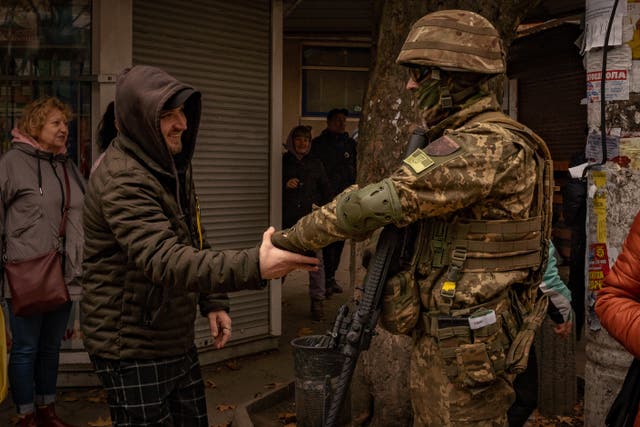only one bag of food was all it took for the Ukrainian grandmother to stop and burst into tears. Fighting a haunting blast of shooting, Ludmilla, 76, sobs as she explains how she has lived through hell for the past eight months.
In May, his son was killed in the bombing of his hometown of Kherson, the last regional capital Russia occupied until it was forced to humiliately withdraw this week.
Ludmilla managed to evacuate her daughter-in-law and grandchildren to Poland, but she remained in Kherson to look after the family home.
With no electricity, water or gas, and with food supplies running low, he limped in the dark alone. That is until the Ukrainian army opened the city on Friday to a jubilant crowd.
"God bless; I haven't had a proper meal in months," he told staff at the global food charity World Central Kitchen, which on Sunday distributed hundreds of emergency food packages to crowds in the recently released city center.
Each package, which contains canned meat, fish, vegetables and staples, is a lifesaver. People describe food prices tripling under the occupation and supplies running out.
"It's been months of hell," Ludmilla continued, clutching her food parcel like a buoy.
“At night, the bombing was very loud. And there's still shooting."
Across the city of Kherson, residents - carrying Ukrainian flags and flowers - have emerged from their homes to greet Kyiv's victorious army, who first entered the outskirts of the city on Friday.
In the face of a successful Ukrainian counter-offensive, Russia ordered the complete withdrawal of its positions on the west bank of the Dnipro river, cutting the strategic area in half.
This marked a potentially devastating defeat for the Kremlin, which just two months ago "annexed" Kherson in a glittering ceremony in Moscow, declaring it and three other regions to remain "Russia forever".
The city of Kherson was the last regional capital to be captured and held by Moscow since the start of the invasion in February. It is the jewel of the Kherson oblast, which Russia claimed early in the war as a strategic land bridge to Crimea, which President Putin illegally annexed in 2014.
Now the land grab is in danger. On Friday Moscow said it had completed the evacuation of 30,000 troops to the eastern bank of the Dnipro without losing "a single soldier".
But the Ukrainians painted a picture of a chaotic retreat, with Russian troops dropping weapons and even drowning while trying to escape.
Soldiers in Kherson said they had found trash cans filled with discarded Russian uniforms when soldiers abandoned them and tried to pretend to be civilians.
An operation is being carried out to eradicate them.
On Sunday Kherson was closed for "screening", a process in which Ukrainian authorities hope to identify suspects.
Stanislav Stoikobv, head of territorial defense in the region, told The Independent that the military estimates that as many as 15 percent of Moscow's troops stationed in Kherson have fallen behind.
"We have to find them. They have no contact with Russian troops across the river," he said.
"We were worried that Russia would start shooting at Kherson, but we didn't panic.
"We needed Kherson's second half and we'll get him soon," he added.
The road to Kherson is a haunted road. The town itself was relatively unharmed, but stranded villages and the remains of vehicles rattled on the edge of the main highway from Mykolaiv, which was pockmarked by used rockets.
These areas were worst hit by heavy artillery fire and the worsening humanitarian crisis.
In the village of Kyselivka, 30 miles north of Kherson, one man said even getting basic necessities was sometimes difficult, as he gladly accepted food aid parcels from WCK.
“When the war started, we couldn't get bread; we are desperate," he said.
"We have to tell our kids 'we don't have any'."
In another suburb, Victor, 62, said the shooting was relentless and people feared the Russians would strike harder now that they had retreated.
"We are worried about the future."
Back in the city center, Olha, 63, said the hardest part of the occupation was the isolation: she had been separated from her daughter for nine months. Occupied Kherson was closed from all of Ukraine by Russia, which controls access to the internet. For months they had no electricity, water or gas supplies, infrastructure that President Volodymyr Zelensky said was deliberately targeted by Russia while its soldiers were away.
In addition to safety concerns, utility companies and authorities are racing to rebuild power, water and gas supplies.
Aid groups like WCK, meanwhile, are starting to enter the city to try to feed the community.
Yuliya Konovalova, WCK's regional coordinator for southern Ukraine, which before the war ran a health food delivery service, said WCK aims to start shipping hot food cooked in neighboring Mykolaiv to Kherson as early as next week.
"We can't prepare food in Kherson until the electricity and water are back on," he said.
“But people need food; they just came out of colonialism. They have no work; food prices go up. We need to help them.”
This is just one of many problems Kherson will face in the near future. Russian troops were located on the other side of the Dnipro, only a few kilometers away, very well within the city's artillery range.
The sound of gunfire echoed throughout the city. The military and residents alike fear the Russian offensive will only escalate as they consolidate their positions post-withdrawal.
"We're preparing our basement in case we have to stay there for the winter if the shooting gets really bad," Ludmilla said, collecting a second bag of food aid to give to his neighbour, whose wife died in the fighting.
“We just don't know what the future holds for this city.
"We are very happy we are free, but we are afraid of what will happen next."





Post a Comment